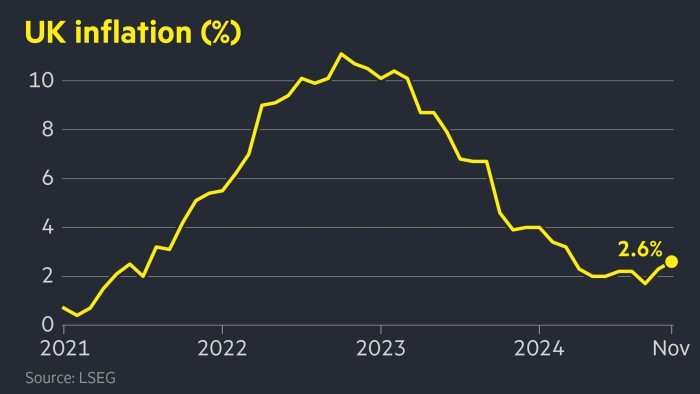Stay informed with free updates
Simply sign up to the UK inflation myFT Digest — delivered directly to your inbox.
UK inflation accelerated to 2.6 per cent in November, highlighting the Bank of England’s challenge as it grapples with persistent price pressures and a stagnating economy.
The rise in the consumer price index was in line with the expectations of economists and above the 2.3 per cent recorded in October. Higher prices for motor fuels and clothing helped push inflation higher, according to figures from the Office for National Statistics on Wednesday.
The increase comes ahead of a meeting of the BoE’s Monetary Policy Committee on Thursday at which it is widely expected to hold interest rates at 4.75 per cent, after reducing borrowing costs twice this year.
GDP has shrunk for two consecutive months, while business surveys point to weaker confidence and curtailed hiring intentions following Rachel Reeves’ tax-rising Budget in October. But a pick-up in UK wage growth has quashed hopes of an interest rate cut at the BoE’s final meeting of the year.
November’s figure “extinguishes any lingering hopes of an interest rate cut on Thursday, while concerns over mounting inflation risks, including the recent spike in pay growth, mean that a February loosening is not a done deal,” said Suren Thiru, economics director at accountants’ body the ICAEW.
Following the release of the data, sterling edged down 0.1 per cent to $1.269.
Governor Andrew Bailey has said the BoE will continue to ease policy gradually.
Core inflation, which excludes energy, food, alcohol and tobacco, was 3.5 per cent in November, the ONS data showed, above the 3.3 per cent recorded in October.
Services inflation, closely watched by the central bank as a gauge of underlying domestic price pressures, was 5 per cent in November, matching October’s figure but below analysts’ expectations of 5.1 per cent.
BoE policymakers have highlighted the persistence of services inflation as a reason to be cautious before lowering interest rates again.
Clare Lombardelli, the deputy governor, told the Financial Times in November that she was worried services price inflation had continued to be “well above” rates consistent with the BoE’s 2 per cent target.
The November services price reading was slightly ahead of the BoE’s own 4.9 per cent forecast.
Inflation has fallen sharply from a peak of 11.1 per cent in October 2022, but the BoE now faces an uptick at a time of increasing strain for the economy.
As well as signs that the Budget has had a chilling effect on companies’ hiring plans, the BoE has said it is assessing whether the increase in national insurance contributions paid by companies announced by Reeves will add to inflationary pressures.
Following the release of November’s inflation figures, Reeves said: “I know families are still struggling with the cost of living and today’s figures are a reminder that for too long the economy has not worked for working people.”


